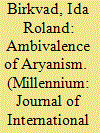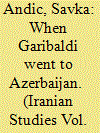| Srl | Item |
| 1 |
ID:
176020


|
|
|
|
|
| Summary/Abstract |
How do historical ideas of global, supremacist connection exist alongside ideas of civilisational and racial difference? And what enables certain reactionary, political alliances to traverse colonial hierarchies of power? With an onset in contemporary, transnational connections between a Hindu and a Western Right, this article offers a critical genealogical reading of the concept of Aryanism. Understanding it as articulated historically through interactions between British colonialists and upper-caste Hindus in India, this reading focuses on these elites’ intersecting and contradictory ideas of hierarchy, difference, and cross-civilisational connection. Tracing the empirical, theoretical and political implications of these entanglements, the article contributes to on-going discussions on the imperial roots of conceptual formations and knowledge production in postcolonial International Relations.
|
|
|
|
|
|
|
|
|
|
|
|
|
|
|
|
| 2 |
ID:
115018


|
|
|
|
|
| Publication |
2012.
|
| Summary/Abstract |
In the early years of the twentieth century, a wave of constitutional revolutions swept over the developing world, attracting the attention of European observers. One of these was the Iranian Constitutional Revolution of 1906-11. British perceptions of this "brave new world" in Iran were more nuanced and diverse than one would expect for this era, commonly portrayed as a time of jingoism and rampant "Orientalist" racism. This study identifies four broad perspectives which shaped British perceptions: the imperialist, Europeanist, liberal idealist and local pragmatist. Within the context of these perspectives, British perceptions were further shaped by different understandings of Iran-influenced by a specifically Iranian-flavored literary Orientalism, Aryanism and history-and by understandings of what constituted an authentic reform or revolutionary movement.
|
|
|
|
|
|
|
|
|
|
|
|
|
|
|
|